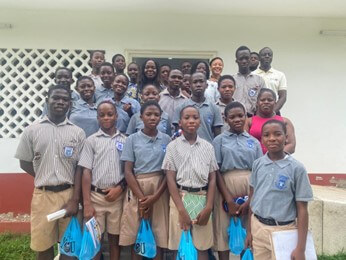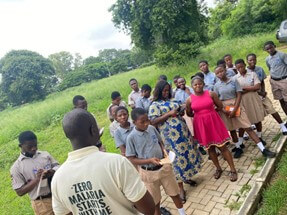Junior high school students visit the mosquito ecology research facility in Ghana

In an exciting educational initiative, a select group of students from University Staff Village Junior High School visited Target Malaria Ghana’s newly commissioned Mosquito Ecology Research Facility at the University of Ghana in Accra. This visit aimed to introduce these young minds to the work of the project, specifically the contributions of Target Malaria Ghana.


The visit, which served as part of the project’s stakeholder engagement activities, allowed 20 students and two teachers to learn about the consortium’s mission to use genetic technology to reduce the population of malaria-transmitting mosquitoes, to reduce the incidence of malaria.
Beyond educating the students about the project’s current efforts, the visit also had a forward-looking goal: to inspire young students to consider careers in scientific research. By sparking interest in the scientific method and its applications, the initiative hopes to cultivate the next generation of African scientists dedicated to solving the continent’s challenges through innovative solutions.
The students were first shown the insecticide testing room, an essential part of the laboratory. This room is to be used to evaluate the effectiveness of insecticides and Ms Eva Ofori explained the work to be done in the room. This room is specifically designed to assess mosquito resistance to these chemicals.
The data collected in this room is crucial for understanding which insecticides are most effective and how resistance in mosquito populations can impact the success of these treatments.
Next, Ms Naana Afua Acquaah showed them the three insectaries in the laboratory where mosquitoes are reared. She named the various mosquito species found in the lab, which are the Anopheles gambiae, Culex, and Aedes species.
Ms Acquaah explained that in the insectary where mosquitoes are maintained, a series of carefully controlled activities are carried out to ensure the healthy rearing and study of the mosquitoes. The process begins with collecting larvae from the project communities in Abutia Amegame and Mafi Agorve, and providing appropriate food until they pupate. The pupae are then transferred to emergence chambers where they develop into adult mosquitoes.
As explained, temperature and humidity are meticulously regulated in the insectary to maintain optimal conditions for mosquito growth and development. Additionally, day and night cycles are managed to simulate natural-like conditions, which helps regulate mosquito behaviour and breeding patterns.
The students were told that larvae are fed with materials like fish food, ensuring they have the necessary nutrients for growth. Adult mosquitoes are typically fed with sugar solutions, and in some cases, blood meals are provided to the females to make them lay eggs.
Ms Ofori and Ms Acquaah took turns explaining the work on pollinator niche. Here Ms Acquaah, explained how Target Malaria is researching into the role of the malaria-mosquito in pollination. Whether Anopheles gambiae mosquitoes visit plants and flowers, and if they pick pollen grains.
A mini-exhibition was mounted in the semi-field processing lab where mosquito eggs, larvae, pupae, and adult mosquitoes were on display. There were also images of the various species of mosquitoes, the life cycle of a mosquito, and the mouth part of a mosquito on display toward educating the visitors.
The students actively engaged during the visit, asking insightful questions that demonstrated their curiosity and interest in science. They were keen to know more about the processes of capturing wild mosquitoes and the role of blood meal in the mosquito’s reproduction. Behavioral aspects of mosquitoes such as daytime and nighttime activities and technicalities like the lab mosquito diet sparked lively discussions with the young visitors.
Their enthusiasm suggests a bright future, with these young learners potentially stepping into the roles of their seniors in the years to come.
Such visits are crucial in fostering a culture of deepening scientific inquiry and problem-solving among young Africans, ensuring that future challenges can be met with homegrown, science-based solutions.
